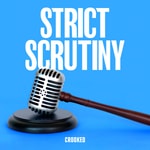More Perfect – Details, episodes & analysis
Podcast details
Technical and general information from the podcast's RSS feed.

More Perfect
WNYC Studios
Frequency: 1 episode/57d. Total Eps: 48

Recent rankings
Latest chart positions across Apple Podcasts and Spotify rankings.
Apple Podcasts
🇺🇸 USA - history
29/07/2025#77🇺🇸 USA - history
28/07/2025#76🇺🇸 USA - history
27/07/2025#68🇺🇸 USA - history
26/07/2025#64🇨🇦 Canada - history
25/07/2025#74🇺🇸 USA - history
25/07/2025#70🇺🇸 USA - history
24/07/2025#83🇺🇸 USA - history
23/07/2025#85🇺🇸 USA - history
22/07/2025#80🇺🇸 USA - history
21/07/2025#78
Spotify
No recent rankings available
Shared links between episodes and podcasts
Links found in episode descriptions and other podcasts that share them.
See allRSS feed quality and score
Technical evaluation of the podcast's RSS feed quality and structure.
See allScore global : 63%
Publication history
Monthly episode publishing history over the past years.
Andy Warhol and the Art of Judging Art
Season 4 · Episode 12
jeudi 3 août 2023 • Duration 41:12
The law protects creators' original work against copycats, but it also leaves the door open for some kinds of copying. When a photographer sues the Andy Warhol Foundation for using her work without permission, the justices struggle not to play art critics as they decide the case. More Perfect explores how this star-studded case offers a look at how this Court actually makes decisions.
Voices in the episode include:
• David Hobbs — known as Mr. Mixx, co-founder of the hip-hop group 2 Live Crew
• Jerry Saltz — senior art critic and columnist for New York magazine
• Pierre Leval — judge on U.S. Court of Appeals for the Second Circuit
• Jeannie Suk Gersen — More Perfect legal advisor, Harvard Law professor, New Yorker writer
• Lynn Goldsmith — photographer
• Andy Warhol — as himself
Learn more:
• 1994: Campbell v. Acuff-Rose Music, Inc.
• 2023: Andy Warhol Foundation for the Visual Arts, Inc. v. Goldsmith
• "Toward A Fair Use Standard" by Pierre Leval
Shadow dockets, term limits, amicus briefs — what puzzles you about the Supreme Court? What stories are you curious about? We want to answer your questions in our next season. Click here to leave us a voice memo.
Supreme Court archival audio comes from Oyez®, a free law project by Justia and the Legal Information Institute of Cornell Law School.
Click here to donate to More Perfect.
Support for More Perfect is provided in part by The Smart Family Fund.
Follow us on Instagram, Threads and Facebook @moreperfectpodcast, and X (Twitter) @moreperfect.
The Original Anti-Vaxxer
Season 4 · Episode 11
jeudi 27 juillet 2023 • Duration 40:57
In 1902, a Swedish-American pastor named Henning Jacobson refused to get the smallpox vaccine. This launched a chain of events leading to two landmark Supreme Court cases, in which the Court considered the balancing act between individual liberty over our bodies and the collective good.
A version of this story originally ran on The Experiment on March 21, 2021.
Voices in the episode include:
• Rev. Robin Lutjohann — pastor of Faith Lutheran Church in Cambridge, Massachusetts
• Michael Willrich — Brandeis University history professor
• Wendy Parmet — Northeastern University School of Law professor
Learn more:
• 1905: Jacobson v. Massachusetts
• 1927: Buck v. Bell
• 2022: Biden v. Missouri
• "Pox: An American History" by Michael Willrich
• "Constitutional Contagion: COVID, the Courts, and Public Health" by Wendy Parmet
Music by Ob (“Wold”), Parish Council (“Leaving the TV on at Night,” “Museum Weather,” “P Lachaise”), Alecs Pierce (“Harbour Music, Parts I & II”), Laundry (“Lawn Feeling”), water feature (“richard iii (duke of gloucester)”), Keyboard (“Mu”), and naran ratan (“Forevertime Journeys”), provided by Tasty Morsels. Additional music by Dieterich Buxtehude (“Prelude and Fugue in D Major”), Johannes Brahms (“Quintet for Clarinet, Two Violins, Viola, and Cello in B Minor”), and Andrew Eric Halford and Aidan Mark Laverty (“Edge of a Dream”).
Shadow dockets, term limits, amicus briefs — what puzzles you about the Supreme Court? What stories are you curious about? We want to answer your questions in our next season. Click here to leave us a voice memo.
Supreme Court archival audio comes from Oyez®, a free law project by Justia and the Legal Information Institute of Cornell Law School.
Support for More Perfect is provided in part by The Smart Family Fund.
Follow us on Instagram, Threads and Facebook @moreperfectpodcast, and X (Twitter) @moreperfect.
Clarence X
Season 4 · Episode 2
jeudi 18 mai 2023 • Duration 57:43
To many Americans, Clarence Thomas makes no sense. For more than 30 years on the Court, he seems to have been on a mission — to take away rights that benefit Black people. As a young man, though, Thomas listened to records of Malcolm X speeches on a loop and strongly identified with the tenets of Black Nationalism. This week on More Perfect, we dig into his writings and lectures, talk to scholars and confidants, and explore his past, all in an attempt to answer: what does Clarence Thomas think Clarence Thomas is doing?
Voices in the episode include:
• Juan Williams — senior political analyst at Fox News
• Corey Robin — professor of political science at Brooklyn College and the CUNY Graduate Center
• Angela Onwuachi-Willig — Dean of Boston University School of Law
• Stephen F. Smith — Notre Dame Law School professor
Learn more:
• 1993: Graham v. Collins
• 1994: Holder v. Hall
• 1999: Chicago v. Morales
• 2003: Grutter v. Bollinger
• 2022: Students for Fair Admissions v. President and Fellows of Harvard College
• 2022: Students for Fair Admissions v. University of North Carolina
• “The Enigma of Clarence Thomas” by Corey Robin
• “Black Conservatives, Center Stage” by Juan Williams
• “Just Another Brother on the SCT?: What Justice Clarence Thomas Teaches Us About the Influence of Racial Identity” by Angela Onwuachi-Willig
• “Clarence X?: The Black Nationalist Behind Justice Thomas's Constitutionalism” by Stephen F. Smith
• “My Grandfather’s Son” by Justice Clarence Thomas
Supreme Court archival audio comes from Oyez®, a free law project by Justia and the Legal Information Institute of Cornell Law School.
Support for More Perfect is provided in part by The Smart Family Fund.
Follow us on Instagram and Facebook @moreperfectpodcast, and Twitter @moreperfect.
The Supreme Court v. Peyote
Season 4 · Episode 1
jeudi 11 mai 2023 • Duration 57:49
More than 30 years ago, a Native American man named Al Smith was fired for ingesting peyote at a religious ceremony. When his battle made it to the Supreme Court, the decision set off a thorny debate over when religious people get to sidestep the law — a debate we’re still having today.
Voices in the episode include:
• Garrett Epps — University of Oregon Law School professor
• Ka’ila Farrell-Smith — Al Smith’s daughter, visual artist
• Jane Farrell — Al Smith's widow, retired early childhood specialist
• Galen Black — Al Smith’s former coworker
• Steven C. Moore — senior staff attorney at the Native American Rights Fund
• Craig J. Dorsay — lawyer who argued Al Smith’s case before the Supreme Court
• Dan Mach — director of the ACLU Program on Freedom of Religion and Belief
Learn more:
• 1963: Sherbert v. Verner
• 1990: Employment Division, Department of Human Resources of Oregon v. Smith
• 2022: 303 Creative LLC v. Elenis
• "Peyote vs the State: Religious Freedom On Trial" by Garrett Epps
• Factsheet: Religious Freedom Restoration Act Of 1993, The Bridge Initiative at Georgetown University
• Our History, the Klamath Tribes
Supreme Court archival audio comes from Oyez®, a free law project by Justia and the Legal Information Institute of Cornell Law School.
Support for More Perfect is provided in part by The Smart Family Fund.
Follow us on Instagram and Facebook @moreperfectpodcast, and Twitter @moreperfect.
The Preamble: Introducing More Perfect Season 4
Season 4
jeudi 4 mai 2023 • Duration 07:42
To kick off the new season, host Julia Longoria returns to high school, where she first fell in love with the Supreme Court. She was a star on her high school’s nationally-ranked “Constitution team” (read: nerd Super Bowl). For Julia, the Court represented a place where two sides of an issue could be discussed and debated. A lot has changed since then — and public perception around the Court is polarized, to say the least. Which is why we’re taking a cue from high schoolers: this season on More Perfect, we’re questioning everything.
Learn more:
• The We the People, The Citizen, and the Constitution Program
Supreme Court archival audio comes from Oyez®, a free law project by Justia and the Legal Information Institute of Cornell Law School.
Support for More Perfect is provided in part by The Smart Family Fund.
Follow us on Instagram and Facebook @moreperfectpodcast, and Twitter @moreperfect.
More Perfect Is Coming Back
Season 1 · Episode 33
jeudi 14 juillet 2022 • Duration 02:41
More Perfect has been dark for four years now. But next year, hosted by Julia Longoria, we're coming back!
The past few weeks have been historic, to say the least, in Supreme Court history. So in the meantime, we want to hear from you. What do you want to know right now about the Supreme Court? What are your questions, your worries, your fears?
Record a voice memo or write us a note and send it to [email protected].
The Unfinished Amendments with Kevin Devine
Season 3 · Episode 9
mardi 4 décembre 2018 • Duration 24:00
In More Perfect's final episode of the season, listen to liner notes for two amendments that contemplate the still-unfinished status of our Constitution. "27" is an album that marks a particular point in our history: this moment when we have 27 Amendments to our Constitution. What will be the 28th?
Maybe it will address our nation's capital. The capital has been a bit of a Constitutional anomaly for much of our nation's history — it's at the heart of the democracy, but because it's not a state, people in Washington D.C. have been disenfranchised almost by accident. The 23rd Amendment solved some of the problem — it gave D.C. the right to vote for president. But it left much of D.C.'s representation questions unanswered. D.C. still does not have voting representation in Congress. Instead, D.C. sends a "non-voting delegate" to Congress. For this liner note, More Perfect profiles that delegate, Congresswoman Eleanor Holmes Norton, and her unique approach to fighting for power in a virtually powerless role.
The song for the 23rd Amendment is by The Mellow Tones, a group of students from D.C. high school Duke Ellington School of the Arts, along with their teacher Mark G. Meadows. The chorus, "Why won't you count on me?" reflects on the continued disenfranchisement of our nation's capital.
The final amendment of the album, the 27th Amendment, put limits on Senators' ability to give themselves a pay raise, and it has arguably the most unusual path to ratification of all 27. The first draft for the amendment was written by none other than James Madison in 1789, but back then, it didn't get enough votes from the states for ratification. It wasn't until a college student named Gregory Watson awakened the dormant amendment centuries later that it was finally ratified. The 27th Amendment song is by Kevin Devine and tells Watson's story.
In Season Three, More Perfect is taking our camera lens off the Supreme Court and zooming in on the words of the people: the 27 amendments that We The People have made to our Constitution. We're taking on these 27 amendments both in song and in story. This episode is best listened to alongside "27: The Most Perfect Album," an entire album (an ALBUM!) and digital experience of original music and art inspired by the 27 Amendments. Think of these episodes as the audio liner notes.
You can listen to all of the songs on "27: The Most Perfect Album" on YouTube and watch music videos from the album.
Follow us on Instagram, Threads and Facebook @moreperfectpodcast, and X (Twitter) @moreperfect.
The Democracy Amendments with Stef Chura
Season 3 · Episode 8
vendredi 30 novembre 2018 • Duration 31:06
This week, More Perfect takes a look at three amendments on the more obscure end of the spectrum. The 12th, 17th, and 20th Amendments made fine-tune adjustments to the way we pick our leaders. More Perfect is here to prove these three are more interesting than you think they are.
For starters, the 12th Amendment is the secret star of the hit musical "Hamilton." The Election of 1800 and the kerfuffle between Aaron Burr and Thomas Jefferson was one of the reasons we passed the 12th Amendment, which made it so that presidential and vice presidential candidates run alongside each other on a single ticket. It was meant to avoid awkward situations where political opponents suddenly had to be partners in government. But Radiolab's Rachael Cusick reflects on the Clinton-Trump race and the ways the 12th Amendment may have polarized politics. Then, listen to Octopus Project's original song about the 12th Amendment.
The idea for the 20th Amendment, which shortened the "lame duck" period for outgoing presidents and members of Congress, was first proposed around the same time as the 12th, but it took years to get political momentum to pass it. That momentum came in part from infamous president, Warren G. Harding, whose missteps ignited a movement to pass it. Huey Supreme wrote an original song about the 20th Amendment from the perspective of a lame duck.
Then, More Perfect skips back to the 17th Amendment, which made the election of U.S. senators more democratic. Our state legislatures used to hand-pick Senators, but the 17th made it so the people elect their Senators directly. More Perfect reflects on whether direct democracy is all it's cracked up to be. Listen to original songs about the 17th Amendment by Stef Chura and Donny Dinero (of Mail the Horse).
In Season Three, More Perfect is taking our camera lens off the Supreme Court and zooming in on the words of the people: the 27 amendments that We The People have made to our Constitution. We're taking on these 27 amendments both in song and in story. This episode is best listened to alongside "27: The Most Perfect Album," an entire album (an ALBUM!) and digital experience of original music and art inspired by the 27 Amendments. Think of these episodes as the audio liner notes.
You can listen to all of the songs on "27: The Most Perfect Album" on YouTube and watch music videos from the album.
Follow us on Instagram, Threads and Facebook @moreperfectpodcast, and X (Twitter) @moreperfect.
The Power Player Amendments with Devendra Banhart
Season 3 · Episode 7
mardi 20 novembre 2018 • Duration 41:41
The 25th and 26th Amendments — ratified in 1967 and 1971, respectively — are some of the newest additions to our founding document. However, they tackle some pretty basic questions: who gets to rule, and who gets to vote? If a president dies or is incapacitated, who takes over? And how old do you have to be in order to participate in American democracy?
In recent months, the 25th Amendment has swirled in and out of news cycles as Americans debate what it takes to declare a president unfit for office. But this episode looks back, even before the 25th Amendment was ratified, at a moment in 1919 when President Woodrow Wilson became bedridden by stroke, and his wife, Edith Wilson, became our country’s unofficial first female president.
The 26th Amendment is best encapsulated in a Vietnam-era slogan: “Old enough to fight, old enough to vote.” Eighteen-year-olds at the time argued that if they were old enough to be drafted to fight in the war, they were old enough to have a voice in our democracy. But what about today, when even younger Americans are becoming victims of gun violence and finding themselves at the center of national political debates? Does it mean we should lower the voting age even further?
When you're done with the episode, check out songs by Devendra Banhart and Suburban Living inspired by Amendments 25 and 26 on "27: The Most Perfect Album."
In Season Three, More Perfect is taking our camera lens off the Supreme Court and zooming in on the words of the people: the 27 amendments that We The People have made to our Constitution. We're taking on these 27 amendments both in song and in story. This episode is best listened to alongside "27: The Most Perfect Album," an entire album (an ALBUM!) and digital experience of original music and art inspired by the 27 Amendments. Think of these episodes as the audio liner notes.
You can listen to all of the songs on "27: The Most Perfect Album" on YouTube and watch music videos from the album, including this one from Devendra Banhart.
Video illustration by Justin Buschardt.Video animation by The Mighty Coconut.
Special thanks to The White House Historical Association.
Follow us on Instagram, Threads and Facebook @moreperfectpodcast, and X (Twitter) @moreperfect.
The Sleeper Amendments with Post Animal
Season 3 · Episode 6
mercredi 14 novembre 2018 • Duration 26:28
On first read the 16th and 22nd Amendments are at best sleepers and at worst, stinkers. In a list of Constitutional hits like the right to free speech, the right to bear arms, and birthright citizenship, the amendments covering taxes and term limits tend to fall by the wayside. But in this episode of More Perfect we take these forgotten gems and make them shine.
The 16th Amendment sets up the income tax, sinking dread into the hearts of millions of Americans every April. But if the income tax is so hated, why did we vote to put it in the Constitution? And why do so many people willingly pay? In this episode we take on those questions and contemplate whether the 16th Amendment might be less about money or law, than is about deciding what it means to belong.
Next we move on to the 22nd Amendment and presidential term limits. If we as U.S. citizens are happy with our leadership, why shouldn't we be able to keep electing the same president for as many terms as we want? The ghost of George Washington comes back to give Franklin Delano Roosevelt some major side-eye as we explore the roots of the rule, and why it matters today.
When you're done with the episode, check out songs by Post Animal and Pavo Pavo inspired by Amendments 16 and 22 on "27: The Most Perfect Album."
In Season Three, More Perfect is taking our camera lens off the Supreme Court and zooming in on the words of the people: the 27 amendments that We The People have made to our Constitution. We're taking on these 27 amendments both in song and in story. This episode is best listened to alongside "27: The Most Perfect Album," an entire album (an ALBUM!) and digital experience of original music and art inspired by the 27 Amendments. Think of these episodes as the audio liner notes.
You can listen to all of the songs on "27: The Most Perfect Album" on YouTube and watch music videos from the album.
Follow us on Instagram, Threads and Facebook @moreperfectpodcast, and X (Twitter) @moreperfect.









